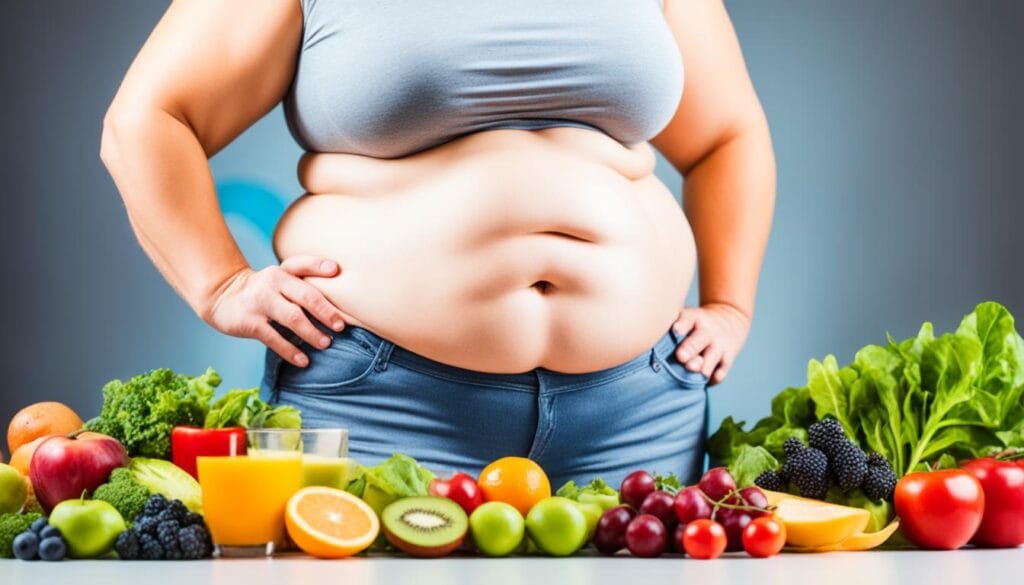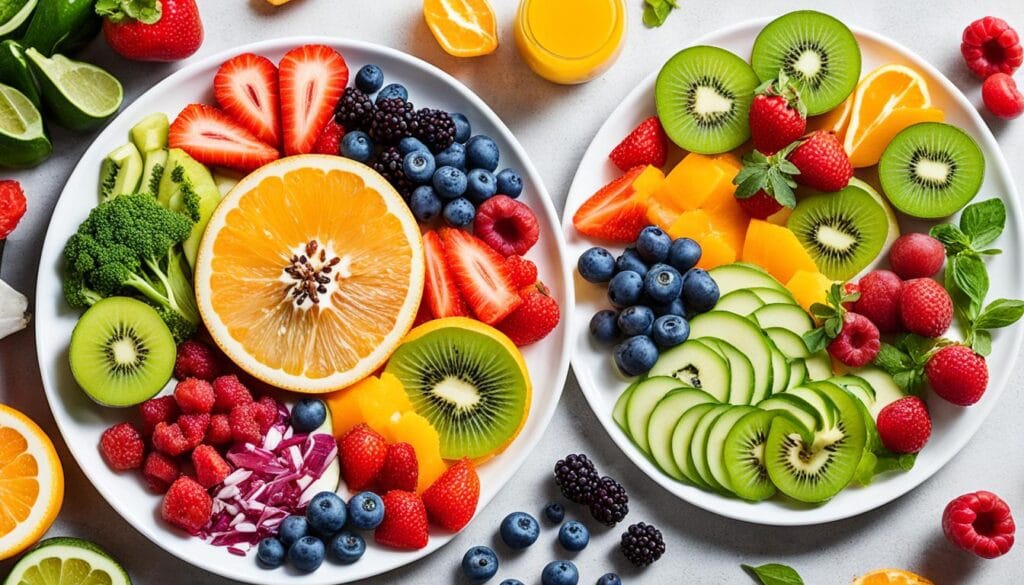
Losing belly fat can be tough, but eating right can help. This article will look at foods and nutrients that target belly fat and boost metabolism. By learning about belly fat and using proven diet tips, you can move closer to your weight loss goals.
Key Takeaways
- Certain foods can help target and reduce belly fat, including high-fiber foods, lean protein sources, and metabolism-boosting options.
- Understanding the different types of belly fat and the risks associated with excess abdominal fat is crucial for developing an effective weight loss plan.
- Proper hydration and regular exercise routines, including cardio and strength training, can complement a healthy diet to support fat loss and a flatter stomach.
- Adopting a balanced, portion-controlled approach to meal planning and maintaining healthy lifestyle habits are key to long-term success in losing belly fat.
- Addressing challenges and incorporating evidence-backed strategies can help overcome stubborn belly fat and maintain a lean, toned midsection.
Understanding Belly Fat
Belly fat, also known as abdominal fat, is a big concern for many. It’s important for health and looks. There are two main types: visceral fat and subcutaneous fat.
Types of Belly Fat
Visceral fat is deep and dangerous, wrapping around organs. Subcutaneous fat is just under the skin. Knowing the difference is key because they affect health differently.
Risks Associated with Excess Belly Fat
Too much belly fat, especially visceral fat, is risky. It can lead to metabolic disorders and cardiovascular disease. Keeping belly fat in check is key for metabolic health and avoiding these problems.
“Excess belly fat is not just a cosmetic concern; it can have significant implications for your long-term health and well-being.”
Knowing about belly fat types and risks helps people make better choices. This can lead to a healthier stomach and lower risks of cardiovascular disease and other health issues.
The Role of Diet in Losing Belly Fat
Eating a balanced diet is key to losing belly fat. By eating fewer calories than you burn, your body uses stored fat for energy. Some foods can also help boost your metabolism, reduce inflammation, and target belly fat.
Choosing the right foods is important for losing belly fat. Here are some tips for a diet that targets belly fat:
- Focus on Whole, Unprocessed Foods: Eat whole grains, lean proteins, fruits, vegetables, and healthy fats. These keep you full and support weight loss. Stay away from processed foods that can hinder your efforts.
- Prioritize Fiber-Rich Ingredients: Fiber helps control blood sugar, aids digestion, and keeps you feeling full. Good sources include oats, beans, lentils, and leafy greens.
- Boost Protein Intake: Lean proteins like chicken, fish, and Greek yogurt help your metabolism and muscle during weight loss. This is key for burning fat.
- Stay Hydrated: Drinking water helps clear toxins, reduces bloating, and boosts metabolic health. This can lead to a flatter stomach.
Following these dietary tips can help you lose belly fat while feeding your body well.
“A healthy diet is not about strict limitations, staying unrealistically thin, or depriving yourself of the foods you love. Rather, it’s about feeling great, having more energy, and keeping yourself as healthy as possible – with the bonus of looking and feeling good.”
| Nutrient | Belly Fat-Fighting Benefits |
|---|---|
| Fiber | Promotes feelings of fullness, regulates blood sugar levels, and supports better digestion. |
| Protein | Helps preserve muscle mass during weight loss and boosts metabolism for enhanced fat burning. |
| Water | Flushes out toxins, reduces bloating, and supports overall metabolic health. |
Foods to Embrace for a Flat Stomach
Getting a flat stomach means making smart food choices. Eating foods rich in nutrients helps with weight loss, feeling full, and keeping your gut healthy. These are key for a flatter belly.
High-Fiber Foods
High-fiber foods like veggies, fruits, and whole grains are great for fighting belly fat. They make you feel full, helping you eat less and manage your weight better. Fiber also helps with digestion and keeps your gut microbiome healthy, which affects metabolism and fat.
Lean Protein Sources
Eating lean proteins like chicken, fish, and plant-based foods is key for a flat stomach. These proteins help you keep muscle while losing fat. They make you feel fuller than carbs or fats. Adding these to your meals helps control hunger, supports muscle recovery, and boosts metabolism, leading to a slimmer stomach.
Focus on high-fiber foods and lean proteins for a balanced diet. These foods help you reach your goal of a flatter stomach. Adding them to your daily meals can lead to a healthier, more toned body.
Metabolism-Boosting Foods
Boosting your metabolism is key to losing belly fat effectively. Certain foods can help increase your body’s energy use. Green tea and spices are great examples of these foods.
Green tea is a top choice for boosting metabolism. It’s full of catechins, which help burn fat and increase energy use. Studies show that drinking green tea regularly can help burn more calories and fat.
Spices like cayenne pepper, ginger, and turmeric also boost metabolism. They contain compounds that make your body produce heat. This heat helps you burn more calories. Adding these spices to your meals can give your metabolism a boost.
Healthy fats are another way to boost your metabolism. Foods like avocados, nuts, and fatty fish have fats that help your body burn calories. These fats make you feel full, which can prevent overeating and help with weight control.
| Metabolism-Boosting Food | Key Metabolic Benefits |
|---|---|
| Green Tea | Increased fat oxidation and energy expenditure |
| Spices (Cayenne Pepper, Ginger, Turmeric) | Triggered thermogenesis and calorie burn |
| Healthy Fats (Avocado, Nuts, Fatty Fish) | Promote feelings of fullness and support weight management |
Adding these metabolism-boosting foods to your diet can help you achieve a flatter belly. Combine them with regular exercise and a balanced diet for the best results.

Hydration: The Key to Flushing Fat
Drinking enough water is key to losing weight and reducing belly fat. It helps with many body processes that aid in fat burning and health. This part will look at how staying hydrated helps get rid of toxins, manage metabolism, and make your midsection flatter. By keeping your body well-hydrated, you help it burn and get rid of extra fat better.
Being well-hydrated keeps your body’s fluid balance right. Water is important for breaking down and getting rid of fat. If you’re not drinking enough water, your body might hold onto it, making you look bloated.
Drinking enough water helps with weight loss and getting rid of belly fat in many ways:
- It helps clear out toxins and waste, making your midsection flatter.
- It boosts your metabolism by helping turn food into energy and burning fat.
- It cuts down on water retention, making you look less bloated.
- It helps you feel full, so you eat less and lose weight.
To keep your body hydrated for fat loss and a flatter stomach, try to drink at least 8 cups (64 ounces) of water each day. Change how much you drink based on your activity level, the weather, and what your body needs. Eating hydrating foods like fruits and veggies also helps with your fluid balance and weight loss goals.
| Hydration Tip | Benefit |
|---|---|
| Drink water before meals | Helps suppress appetite and prevent overeating |
| Carry a water bottle with you | Encourages consistent water intake throughout the day |
| Infuse water with fruits or herbs | Adds flavor and variety to keep hydration interesting |
Remember, drinking enough water is a big part of losing fat, boosting metabolism, and getting a flat midsection. Make sure to focus on your hydration and watch your belly fat disappear.
Belly Fat and Weight Loss
Losing belly fat is a common goal for many looking to get healthier and look better. It’s important to understand how belly fat, weight loss, and a whole approach to losing fat work together.
Too much belly fat, or visceral fat, is more than just a beauty issue. It shows how healthy someone is and can affect their body and health. Just focusing on losing weight might not show the whole story. Where fat is stored, like in the belly, affects health and metabolism.
To fight belly fat, you need a plan that covers diet and lifestyle. Eating well, exercising regularly, and managing stress are key. These changes can help cut down on belly fat and make your body healthier.
Factors Affecting Belly Fat and Weight Loss
- Genetics and hormonal issues can affect how fat is stored.
- Stress and poor sleep can raise cortisol levels, leading to more belly fat.
- Being inactive and eating badly, like lots of processed foods and sugar, makes it worse.
Knowing what causes belly fat and weight issues helps people find the right way to lose weight for good.

“The key to losing belly fat is not only about what you eat, but also how you live your life. A holistic approach that considers your overall body composition and fat distribution can be the most effective path to a flatter stomach and improved health.”
Fat-Burning Exercise Routines
Adding targeted exercise routines to your life can help with belly fat reduction. By learning about different workouts, you can make a complete fitness plan. This plan supports your weight loss goals and helps you get a flatter stomach.
Cardio Exercises
Cardio exercises are key for burning fat. Activities like walking fast, jogging, swimming, and biking make your heart work harder. This helps burn calories and speeds up your metabolism. Doing cardio regularly can help get rid of hard-to-lose belly fat.
Strength Training
Strength training is also vital for losing belly fat. Exercises like squats, lunges, and deadlifts work on big muscle groups. They help build lean muscle. This means you burn more calories, even when you’re not moving.
| Exercise Type | Benefits for Belly Fat | Example Exercises |
|---|---|---|
| Cardio | Boosts metabolism, burns calories | Brisk walking, jogging, swimming, cycling |
| Strength Training | Builds muscle, increases fat-burning potential | Squats, lunges, deadlifts |
“Combining cardio and strength training is the most effective approach for targeting stubborn belly fat and sculpting a lean, toned midsection.”
Mixing cardio and strength training in your routine creates a strong combo. This combo boosts fat-burning and helps you reach your goal of flat abs.
Healthy Lifestyle Habits
Getting a flat stomach is more than just about diet and exercise. It’s important to focus on overall healthy habits for losing belly fat and keeping a healthy weight. This includes managing stress, getting good sleep, and taking care of your gut health. These habits can greatly affect how you manage your weight and where fat is stored.
Stress Management
Too much stress can mess with your body’s hormone balance, making more cortisol. High cortisol levels are linked to gaining belly fat, the fat around your organs. To fight this, try meditation, yoga, or deep breathing exercises. These can lessen stress’s bad effects and help you stay at a healthy weight.
Quality Sleep
Good sleep is key for your health, including keeping your weight in check. Lack of sleep messes with hormones that control hunger and metabolism, leading to weight gain and more belly fat. Try to get 7-9 hours of sleep each night to help your body burn fat naturally.
Gut Health
Your gut microbiome is key to managing your weight and fat distribution. Bad gut bacteria can cause inflammation, insulin resistance, and more belly fat. Eating foods high in probiotics, like yogurt, kefir, and fermented veggies, can boost your gut health. This supports a healthy weight and a flatter stomach.
By focusing on these lifestyle areas, you can create a full plan to tackle stubborn belly fat and get the flat stomach you want.

Meal Planning for Flat Abs
Getting a flat, toned midsection is not just about exercises. It’s also about planning your meals well. By controlling portions and balancing your diet, you can help your weight loss and shape your abs.
Portion Control
Controlling how much you eat is key to losing fat. Eating too much, even healthy foods, can stop your weight loss. Use your palm or a standard dinner plate to gauge your food portions. Eating smaller, more frequent meals can also help you avoid eating too much.
Balanced Macronutrients
It’s also important to balance your diet with the right mix of proteins, carbs, and fats. Aim for 40% proteins, 30% carbs, and 30% fats to support your metabolism and muscle. Include lean proteins, complex carbs, and healthy fats in your meals for the best results.
| Macronutrient | Recommended Ratio | Examples |
|---|---|---|
| Proteins | 40% | Lean meats, poultry, fish, eggs, legumes |
| Carbohydrates | 30% | Whole grains, fruits, vegetables |
| Healthy Fats | 30% | Avocado, nuts, olive oil, fatty fish |
Using these meal planning tips can help you lose belly fat and reach your fitness goals. Remember, sticking with it is crucial for any weight loss plan.
Overcoming Challenges
Losing belly fat is tough, with many obstacles along the way. Emotional eating and lifestyle issues can make it hard. But, with the right approach and mindset, you can beat these challenges and succeed.
Emotional eating often stops people from losing weight. When stressed or upset, many turn to food for comfort. To fight this, learn healthy ways to handle stress like mindful meditation, yoga, or regular exercise. This helps you stop emotional eating and reach your weight loss goals.
Other lifestyle factors can also slow down your progress. Poor sleep, sitting too much, and not moving enough can add belly fat. To beat these, focus on healthy sleep habits, moving more every day, and finding fun physical activities you can do regularly.
“The journey to a flat stomach is not just about what you eat, but also how you live your life. By addressing the emotional and lifestyle challenges, you can unlock the key to lasting weight loss success.”
Getting a flat stomach isn’t just about diet or exercise. It’s a journey that needs patience, effort, and facing the weight loss challenges, belly fat, emotional eating, stress, and lifestyle factors that slow you down. With the right mindset and strategies, you can beat these hurdles and achieve your goals.
Targeting Visceral Fat
When it comes to losing weight and reducing fat, visceral fat is a big concern. This deep, dangerous fat is not just about looks. It’s a serious threat to your health and heart.
Visceral fat is deep inside your belly, around vital organs like the liver and stomach. This location makes it very dangerous. It can cause inflammation, insulin resistance, and other health problems.
Understanding the Dangers of Visceral Fat
Having too much visceral fat increases your risk of type 2 diabetes, heart disease, and some cancers. It also raises your risk of metabolic syndrome, which includes high blood pressure and high cholesterol.
Reducing visceral fat is key to better health and well-being. By focusing on this fat, you can lower your heart disease risk and improve your metabolic health. You’ll also get a more toned midsection.
Strategies for Targeting Visceral Fat
- Eat a diet full of nutrients, lean proteins, whole grains, fruits, and veggies.
- Do regular aerobic exercises like walking, jogging, or cycling to burn calories and lose fat.
- Include strength training to work on your core and abs, which helps reduce visceral fat.
- Manage stress with meditation or yoga to avoid gaining visceral fat.
- Get enough sleep to prevent gaining more visceral fat.
Using a mix of diet and lifestyle changes can help you target and reduce visceral fat. This will improve your health and well-being.
| Characteristic | Subcutaneous Fat | Visceral Fat |
|---|---|---|
| Location | Beneath the skin | Surrounding internal organs |
| Health Risks | Mainly cosmetic concerns | Increased risk of metabolic disorders and cardiovascular disease |
| Metabolic Activity | Less metabolically active | More metabolically active, producing inflammatory substances |
| Difficulty to Lose | Relatively easier to lose | Harder to lose, requiring targeted strategies |
Understanding visceral fat and using targeted strategies can greatly improve your health. It can lower your risk of heart disease and help you reach your weight loss goals.
Supplements for Fat Burning
A balanced diet and regular exercise are key for losing weight or reducing belly fat. Some supplements can add extra help. Knowing the benefits and limits of fat-burning supplements helps readers make smart choices for their health and fitness goals.
Green Tea for Metabolism
Green tea is known for helping burn fat. It has caffeine and catechins that boost metabolism and break down fat cells. Drinking green tea daily can help your body burn fat naturally.
Protein Powder for Muscle Building
Protein is vital for muscle growth and maintenance. This helps increase metabolism and burn more calories. Protein powders, like whey or plant-based, make it easy to get enough protein. Adding protein powder to post-workout drinks or snacks aids in losing weight and reducing belly fat.
| Supplement | Potential Benefits | Considerations |
|---|---|---|
| Green Tea | Increased metabolism, fat breakdown | Caffeine content may cause jitters or disrupt sleep |
| Protein Powder | Muscle building, metabolism boost | Ensure you choose a high-quality, low-sugar option |
Remember, supplements should not replace a healthy diet and regular exercise. Always talk to a healthcare professional before starting any new supplements, especially if you have health conditions or take medications.
“Supplements can be a useful tool in your weight loss arsenal, but they should never be the sole focus. Maintain a healthy, balanced diet and active lifestyle for the best results.”
Maintaining Results Long-Term
Getting a flat stomach is just the start. Keeping the results long-term is the real challenge. It’s about making lifestyle changes and sticking to healthy habits over time.
Understanding habit formation is key to success. Small, daily changes can lead to big changes over time. Swapping sugary snacks for healthy ones or exercising regularly can make healthy choices easy.
Looking at lifestyle factors is also important. Stress, sleep, and overall health affect long-term weight loss and belly fat reduction. A holistic approach can help you keep your weight in check.
Being flexible is crucial for long-term weight loss and belly fat reduction. As you change, so should your strategies. Regular check-ins, expert advice, and openness to change can keep you moving forward.
The journey to a flat stomach is ongoing. By sticking to sustainable habits, focusing on lifestyle factors, and being adaptable, you can keep seeing results. Your efforts will pay off for years to come.
| Key Strategies for Long-Term Belly Fat Reduction | Benefits |
|---|---|
| Forming Healthy Habits | Establishes a sustainable routine, making healthy choices the new normal |
| Addressing Lifestyle Factors | Supports overall well-being and creates a strong foundation for weight management |
| Maintaining Adaptability | Allows for adjustments as your body and needs evolve, preventing plateaus |
Conclusion
This article offers a detailed guide to getting a flatter stomach and better health. It covers the importance of belly fat, eating foods that boost metabolism, and doing exercises that target the midsection. These steps help readers work towards their weight loss goals.
Keeping a healthy lifestyle, drinking plenty of water, and making lasting habits are key for success. The path to a flatter stomach and better health may be tough, but with the right attitude and dedication, it’s achievable.
The secret to lasting change is a mix of science and what feels right for you. By following these tips, readers can start a journey to a healthier, more confident life. They’ll enjoy the perks of a healthy, toned belly along the way.
FAQ
What are the different types of belly fat?
Belly fat comes in two main types: visceral and subcutaneous. Visceral fat is deep and dangerous, wrapping around organs. Subcutaneous fat is under the skin.
What are the risks associated with excess belly fat?
Too much belly fat, especially visceral fat, increases the risk of metabolic disorders and heart disease. Knowing about belly fat types and risks helps in losing fat effectively.
How does diet play a role in losing belly fat?
Diet is key to losing belly fat. Eating fewer calories and choosing nutrient-rich foods helps burn abdominal fat. Some foods also boost metabolism and target visceral fat.
What are some high-fiber foods that can help with losing belly fat?
Foods high in fiber like veggies, fruits, and whole grains make you feel full. They also help with gut health and weight control.
What are some lean protein sources that can help with losing belly fat?
Lean proteins like chicken, fish, and plant-based options help keep muscle while losing fat.
What are some metabolism-boosting foods that can help with losing belly fat?
Foods like green tea, spices, and healthy fats increase energy use and fat burning for weight loss.
How important is hydration in losing belly fat?
Drinking enough water is vital for losing belly fat. It helps with fat burning and overall health.
What types of exercises are effective for targeting belly fat?
Cardio and strength training work well for burning fat and shaping the midsection.
How do lifestyle habits like stress management and sleep quality affect belly fat?
Healthy habits like managing stress and sleeping well affect weight and belly fat. They help reduce stubborn belly fat.
How can proper meal planning help with losing belly fat?
Planning meals with balanced nutrients and portion control helps with fat loss and muscle keeping for a flatter stomach.
How can one overcome challenges like emotional eating and stress when trying to lose belly fat?
Overcoming emotional eating and stress is key to staying on track with losing belly fat.
What strategies are effective for targeting visceral fat specifically?
Targeting visceral fat requires specific strategies to tackle this deep, dangerous belly fat.
What role do supplements play in losing belly fat?
Supplements like green tea and protein powders can help with metabolism and fat burning. But diet and exercise are more important.
How can one maintain a flat stomach long-term?
Keeping a flat stomach long-term means making healthy habits and managing lifestyle changes for lasting weight control and a flat midsection.

